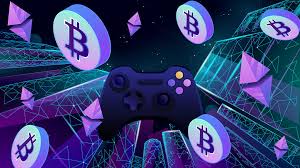The Rise of Blockchain in Various Sectors and Its Impact on Gaming
Blockchain technology has significantly transformed multiple industries, including finance, healthcare, real estate, and public services, by offering enhanced security and privacy. Its foray into the gaming industry is no exception, revolutionizing this sector with groundbreaking advancements. A report by Markets and Markets revealed that the global blockchain gaming market, valued at $4.6 billion in 2022, is projected to skyrocket to $65.7 billion by 2027, indicating a compound annual growth rate of 70.3%.
The Growing Popularity and Advantages of Blockchain in Gaming
Blockchain’s rise in gaming popularity is driven by numerous benefits it offers, such as:
- Financial Incentives and GameFi: Blockchain has been pivotal in popularizing the play-to-earn model in gaming, laying the foundation for GameFi, which merges online gaming with decentralized finance. This model enables players to earn cryptocurrencies, exclusive items, and NFTs through gameplay and milestones. Some NFTs even possess real-world value, tradable on NFT marketplaces.
- Ownership and Authenticity: Blockchain allows players to have genuine ownership of digital assets and NFTs acquired in games. These assets, including characters and items, are tokenized, offering players real ownership outside the game’s ecosystem. Blockchain also provides provenance, helping buyers verify the authenticity and history of items before purchasing.
- Improved Payment Systems: With blockchain, gaming payments are faster and more cost-effective compared to traditional banking systems. This speed benefits players looking for quick in-game purchases. Blockchain transactions have lower fees and provide enhanced security, transparency, and trust. The technology facilitates easy cross-border transactions, beneficial for online casinos catering to a global audience. These casinos often accept cryptocurrencies, removing the need for major fiat currencies, and maintain an immutable record of all payments on the blockchain.
Challenges Facing Blockchain Gaming
Before blockchain can be deemed the new gaming standard, several challenges need addressing:
- Technical Expertise: The complexity of integrating blockchain with gaming can be a barrier for developers unfamiliar with the technology. This is also true for consumers, like players at crypto casinos, who must understand cryptocurrency volatility and learn to use crypto wallets.
- Scalability Issues: Scalability problems in blockchain limit its benefits for gaming. Many networks struggle with high transaction volumes, leading to delays that can disrupt gaming experiences. While layer-2 networks offer some solutions, scalability remains a significant challenge.
- Security Concerns: Despite blockchain’s inherent security, platforms, particularly centralized ones, are vulnerable to hacking. For example, in March of the previous year, Axie Infinity’s Ronin sidechain suffered a breach, resulting in a theft of approximately $650 million in ETH and USDC tokens.
The Future of Blockchain in Gaming
The blockchain gaming sector stands to benefit from major gaming companies adopting the technology. For example, Bandai Namco Entertainment Inc., known for iconic games like Pac-Man and Tekken, has ventured into blockchain gaming with Ryuzo, an AI-powered pet game featuring NFTs. Other gaming giants like Ubisoft and Sega are showing interest in developing games on the Oasys chain, which hosts Ryu NFTs. The number of crypto-accepting casinos is also on the rise, now thought to exceed 900.
While these developments are significant, blockchain technology may not immediately become the gaming industry standard. The increase in adoption and development of solutions to the aforementioned challenges will be key in determining blockchain’s future role in gaming.

